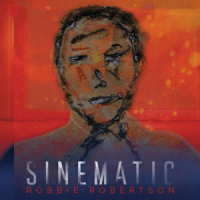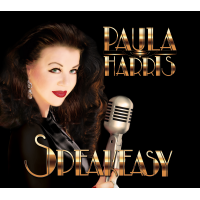Home » Jazz Articles » Album Review » Robbie Robertson: Sinematic
Robbie Robertson: Sinematic
In what is almost but not quite a connect-the-dots pattern, Robertson appears to compose through following a template by which he turns out tunes like "The Shadow" and "Beautiful Madness" that are either too clever for their own good or alternately ponderous and pretentious. "Hardwired" radiates more of the shadowy atmosphere implicit in this album title, ironically perhaps because of its reliance on programming by co-composers Howie B and Joe Hirst. It certainly isn't the only track of the thirteen to engross by the depth and clarity of its sound alone, but it is one of the few that doesn't render merely a superficial attribute the sonics mastered so expertly by Gavin Lurssen. "Street Serenade" is intoxicating too, but that has more to do with the audio mix than vivid compositional detail -see "Rags and Bones" from Northern Lights, Southern Cross (Capitol, 1975) for its likely precursor.
Van Morrison's vocal on "I Hear You Paint Houses" also adds to the noir narrative Robertson concocts on and off here. Yet its melody, arrangement and style are again eerily similar to that last great album Robertson made with Helm, Danko, Manuel and Hudson, as well as the flawed masterpiece that is Cahoots (Capitol, 1971). In comparison to the Belfast Cowboy (who made a cameo on that latter album too), most anyone's singing talent might suffer, but the presence of the Irish soulman only highlights the limited range of Robertson's own voice: his croaky timbres have their charm, but nevertheless beg the question of why he doesn't more often enlist the help of others to sing his songs: Lucy Satterfield imbues "Walk In Beauty Way," (a tune she actually co-wrote with the songwriter/guitarist) with a sultry air that becomes altogether dreamlike before the track concludes.
Robertson's singing carries an unusual depth on "Once Were Brothers" and that's hardly surprising. The song revolves around autobiographical references introduced by its title, that of the documentary about the iconic group based on the author's memoir Testimony (Crown Archetype, 2016). But it is actually the backup vocals of Citizen Cope and J.S. Ondara that bring out the poignancy of the recollection more than his own. Meanwhile, the absence of the Canadian's guitar is somewhat confounding, although it is slightly more prominent at the outset of "Dead End Kid." That conundrum might well be explained by the years Robertson spent as a guitar hero, with Ronnie Hawkins and Bob Dylan, but it is one rendered deeper by the presence of Derek Trucks (and his guitar partner from Eric Clapton's band, Doyle Bramhall II) on "Remembrance." Ostensibly a bonus track, the string effects mix with the fretboard work to conjure such a ghostly atmosphere as to suggest such an approach might well be a fruitful initiative for Robertson to pursue after this sixth solo endeavor of his. The other instrumental here is also the album's shortest cut: "Wandering Souls," doesn't go on long enough to reveal if this core trio of Robertson, bassist Pino Palladino and drummer Chris Dave—all three of whom appear throughout the record—ever engage with each other long enough to squeeze out sparks comparable to its corollary.
The inclusion of Robertson's self-created paintings representing each song on Sinematic suggests ever so slightly the man may be spreading himself too thin, at least insofar as writing, playing and recording music is but one of his abiding passions (this album also was inspired in part by working with Martin Scorsese on the latter's movie The Irishman). The deceptive but fleeting depth at the heart of this album hints at what he might produce if he concentrated on composing, performing and recording, if only for the period of time required to follow the course of his inspiration.
Track Listing
I Hear You Paint Houses; Once Were Brothers; Dead End Kid; Hardwired; Let Love Reign; Shanghai Blues; Wandering Souls; Street Serenade; The Shadow; Beautiful Madness; Praying for Rain; Remembrance.
Personnel
Robbie Robertson
bass, electricRobbie Robertson: vocals, guitar, keyboard; Derek Trucks: slide guitar; Doyle Bramhall II: guitar; Van Morrison: vocal; Glen Hansard: vocal; Afie Kurvanen: guitar, backing vocals; Randy Kerber: organ, keyboard; Martin Pradler: keyboard, string programming; Frederic Yonnet: harmonica; DJ Howie B: programming; Joe Hirst: programming; Terry and The Octo Pirates: guitar, organ, Wulitzer; Jim Wilson: keyboard, programming; Pino Palladino: bass; Reggie Hamilton: bass; Jim Keltner: drums; Chris Dave: drums; J.S. Ondara, Citizen Cope, Glen Hansard, Felicity Williams: backing vocals.
Album information
Title: Sinematic | Year Released: 2019 | Record Label: Universal Music Group
Tags
PREVIOUS / NEXT
Support All About Jazz
 All About Jazz has been a pillar of jazz since 1995, championing it as an art form and, more importantly, supporting the musicians who make it. Our enduring commitment has made "AAJ" one of the most culturally important websites of its kind, read by hundreds of thousands of fans, musicians and industry figures every month.
All About Jazz has been a pillar of jazz since 1995, championing it as an art form and, more importantly, supporting the musicians who make it. Our enduring commitment has made "AAJ" one of the most culturally important websites of its kind, read by hundreds of thousands of fans, musicians and industry figures every month.





















